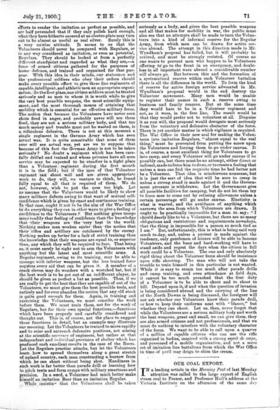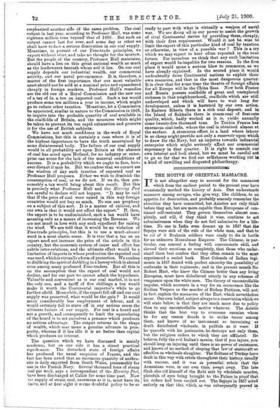OUR COAL EXPORT.
IN a leading article in the Morning Post of last Monday attention was called to the large export of English steam coal to France, and Professor Hull's address at the Victoria Institute on the afternoon of the same day emphasised another side Of the same problem. The Coal output in last year, according to Professor Hull, was some eighteenmillion tons beyond' tbat of 1898.. But such an output cannot last for ever, and some day or other we shall have to face a serious diminution in our coal supply.
Meantime, in pursuit of our Free-trade principles, we export without stint, and take no thought for the morrow. But the people of the country, Professor Hull maintains, should have a. lien on this great national wealth as much as the landowners beneath whose soil it lies. On our coal supply depends our industrial wealth, our commercial activity, and our naval pre-eminence. It is, therefore, a matter of the first importance that our Most valuable asset should not be sold at a nominal price and squandered cheaply in foreign markets. Professor Hull's remedies are the old one of a Royal Commission and the new one of 'a tax of 5s. a ton On exported coal. Such 's. tax would produce some ten millions a year in income, which might go to reduce other taxation. 'Meantime, let a Commission be appointed, similar in nature to the Commission in 1866, to inquire into the probable quantity of coal available in the coalfields of Britain, and the measures which might be taken to prevent its too rapid exhaustion and preserve it for the use of British subjects. • We have not much confidence in the work of Royal Commissions, but this is certainly a case where it is of the highest importance to have the truth ascertained by some disinterested body. The failure of our coal supply would in all probability act upon Britain as the • absence of coal has acted upon Holland, for no industry or enter- prise can atone for the lack of the material conditions of success. It is a probability which we ought to face, how. ever distaiit it may be. But we confess that we cannot see the wisdom of any such taxation of exported coal as Professor Hull proposes. Either we wish to diminish the consumption of coal, or we do not. If we do, then pre- sumably a tax would bring about this result. But 'this is precisely what• Professor Hull and the Morning Post are careful to declare will not happen. "It may be said that if the price of coal were -raised in this way foreign countries would not buy so- much. No one can prophesy on a subject of this sort. It is a Matter of opinion, and our own is that it would not affect the export." If, then, the export is to be undiminished, such a tax would have meaning only as a means of increasing the Revenue. We are not much in love with any such expedient for raising the wind. We are told that it would be no violation of Free-trade principles, but this is to use a• much-abused word in a most elastic sense. It is true that a tax on an export need not increase the price of the article in this codntry, but the economic system of cause and effect has subtle inter-relations, and the ultimate effect 'would be a limitation of imports in whose production the exported coal was need, which is virtually a form of protection. We confess to disliking the spiritof dabbling in a heresy which is abroad even among many professed Free-traders. But all this is on the assumption that the export of coal would not decline, and for our part we cannot admit the hypothesis. Valuable and convenient as is our coal market, it is not the only one, and a tariff of five shillings a ton would mqce it worth the Continental importer's while to go further afield. Mean while, if the export fell off and our coal supply was preserved, what would be the gain ? It would mean considerably less employment of labour, and it would certainly fail to stave off in any serious sense the ultimate failure of our supply. For coal is a hoard and not a growth, and consequently to limit the squandering of the hoard is to set ourselves a penance which produces no serious advantage. The output returns in the shape Of *wealth, which may mean a genuine advance in pros. parity, whereas if it lies idle it is no better than capital which produces no interest.
The question which we have discussed is mainly academic, but on one side it has _a direct practical significance. The disturbed state of foreign affairs has produced the usual suspicion of France, and the fact has been noted that an enormous quantity of anthra- cite is daily exported from South Wales, presumably for use in the French Navy. Several thousand tons of steam ?oal per week, says a correspondent of the Horning Post, 'mare been discharged at Calais for some time past. Now )ur supply of steam coal, enormous as it is, must have its imits, and at first sight it seems doubtful policy to be so feady to partwith -what -is virtually s' weapon of navid war. We are doing all in our' power-to assist the 'grow vim of rival Continental -navies by providing them, cheaply; with their first requirement. Would .it not be .wise -to limit the export of this particular kind of coal by taxation or otherwise, in view of a possible war ? -This is a cry which we may expect to hear often repeated- in th,0 near, future. For ourselves we think that any such limitation, of export would be impolitic for two reasons. In the first. place it wonld mean a serious blow to commerce, as we have already explained. In the second place it, would undoubtedly drive Continental nations to exploit. their own resources, and that in the most dangerous quarter: It is clear that for some time the theatre of foreign affairs for all Europe will be the China Seas. Now both France and Russia possess coalfielde of great and uneXplored• richness in that neighbourhood, coalfields which are still undeveloped and which • will. have to wait -long for development, unless it is hastened by our own action. In .Eastern Siberia there is a rich coal. deposit, and iti the Island of Sakhalin there.. is steam-coal of first,rate quality, which; -badly worked as it, is, yields annually some twenty,five thousand tons, In Tonkin -France has enormous coal-beds, where the coal' is obtained almost at, the surface. A strenuous effort. in a land where labour is so cheap might provide not only a reservoir upon which to draw for the Navy, but an impetus towards industrial enterprise which might seriously affect our commercial supremacy in that quarter.- It is right to consult . our own interest and look ahead, but we must be careful not to go so far that we find our selfishness working ontist a kind of unwilling and disgusted philanthropy. . .



































 Previous page
Previous page